
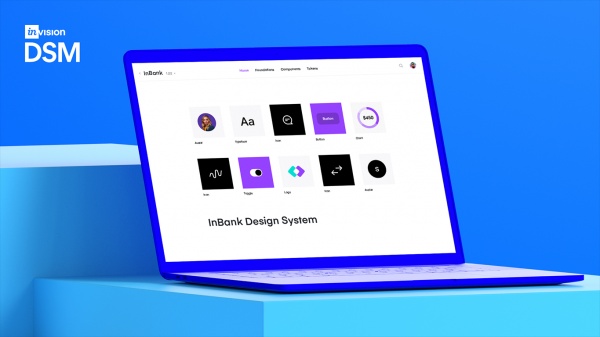
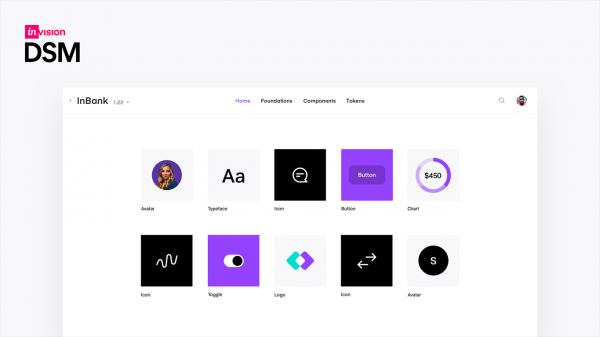
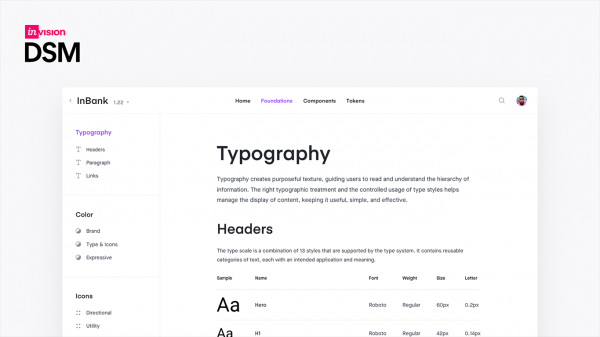
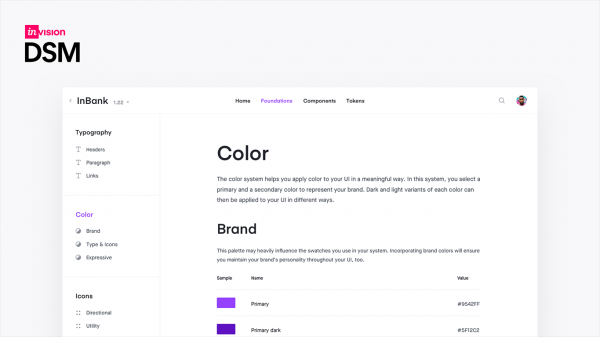
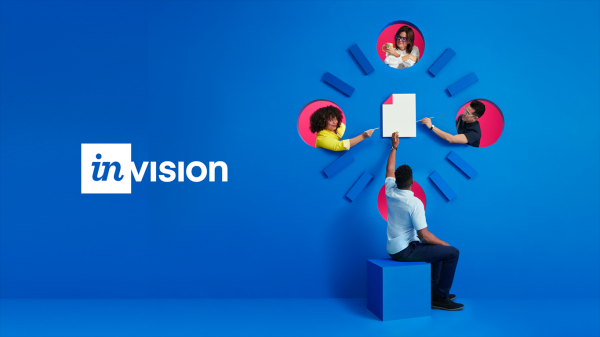

Project Overview
InVision’s innovations in 2020 were all about empowering teams to create amazing, company-saving and strategy-shifting products that consumers would love—and produce them at scale to meet market demand. InVision’s innovations in products, processes, and know-how drive toward that aim.
This year, thousands of organizations came to InVision looking to increase and scale their design capabilities, and we responded with strategic updates targeted at their needs. Companies need to make digital product design more efficient and cohesive across touchpoints. Our new Design System Manager (DSM), launched in August, allows teams to easily leverage reusable components and not reinvent the wheel. At the most essential level it’s an accelerant of digital product development, and its adoption and use allows both large and small companies to expand digital workflow and brand consistency.
This product is fundamental to our platform going forward because it unlocks true collaboration. DSM enables designers, developers, and others to collaborate seamlessly and quickly, removing barriers to communication and high-friction handoffs, while letting teams establish a system of components together so they can build much more fluidly. Our team also brought in key new design system consulting stars who have literally written the book on design systems, and for every new DSM customer, we embed these experts to lead a new kickstarter program that gets the customer up and running quickly. Companies that use our platform get their products to market 30% faster on average—and they can do this just as easily remote as they can in-person.
Organisation
Project Brief
The challenges for the design system community are immense. For teams of all sizes, inconsistencies and redundancies get in the way. If a team wants to create a design system, most of them are only in the early stages or starting over after failed attempts; they are focused on building foundations and haven’t fully considered the process and challenges. Even mature teams rely on human-driven, hands-on processes to keep the system current and in sync across design and code. Maintaining documentation is tedious and painful because it exists in many different places and is often out-of-date somewhere.
To boot, the very definition of a design system is up for debate. Some companies believe that a design system can be composed purely of development notes and coded components in Storybook, or that a Google Drive folder or documents in Wordpress can serve as a design system. Some systems may be as poor as glorified font and image libraries, or as impenetrable as proprietary software for the largest tech behemoths.
This is not how we define a true design system, nor would any of these products deliver the velocity and efficiency that organizations around the globe need now. Solving these problems is what DSM set out to do. DSM is a centralized yet personalized platform that gives every role all the tools they need to design, critique, and code digital products in the works. It kickstarts every product with all of the branding already built in.
Project Innovation/Need
Today, companies are working in overdrive to deliver new types of digital products for a changing world. They need design solutions that scale effortlessly, across teams, departments and, especially now, locations.
DSM is a cross-functional platform that brings designers, developers, and collaborators into a shared workflow and single source of truth.
Only DSM connects design and code, so teams can work smarter, faster, and in sync. Our revamped web onboarding experience is packed with in-platform tips, while tutorials guide users towards early achievements and more flexible documentation experiences; the product integrates with Sketch, enabling teams to distribute and version Sketch Libraries as part of a holistic system; and a richer, more flexible documentation site easily houses and syncs changes for design principles, live components, accessibility standards, copy guidelines, and more.
DSM gives teams a toolbox that’s easy to get started with and grow with as they advance on the design system maturity spectrum.
According to PGS software, “A design system can shorten the time needed by as much as 45%.” And, “Without a single source of truth, 70% of a designer’s time is wasted on repeating unnecessary tasks, instead of being allocated towards other, better uses, such as User Experience research, experimenting with different versions of the same view and so on.”
In May 2020, InVision introduced the most comprehensive update to DSM ever. Since then, usage has skyrocketed, with 10,000+ users across 5,000+ teams, from Bank of America to Nike, Salesforce, Viacom and the Wall Street Journal.
User Experience
DSM is the map for how digital products can be created without waste. Across industries, including technology, banking, retail, and more, the new InVision DSM is a step-function upgrade available to design and development teams in need of the following:
An improved onboarding experience. A design system is daunting to set up--and only works if the team uses it. Seamless onboarding and flexible documentation eliminates this issue.
A unified design system encompassing design, code, and documentation to pave the way for cross-team productivity. Standardizing naming conventions, accessibility requirements, and file structure helps teams work consistently and prevent errors. Components, or portions of reusable code within a system, range in complexity. It’s easy to spot existing components and styles with InVision Inspect, and get production-ready code with a built-in Storybook integration.
Enterprise-ready workflow. As apps and their companies age, they build design debt by building for the short-term. Our enterprise-ready workflow eliminates the barriers to putting a design system in place, and gives teams peace-of-mind that visual assets are secure.
Thanks to long-term collaborative work between hundreds of InVision customers and our core in-house DSM team—some formerly part of or leading the IBM Cloud team’s Carbon Design System, Google Material design system, Salesforce Lightning design system, and the Shopify Polaris design system—DSM delivers an industry-leading design system platform. It’s the foundation for world-class digital product design and development, helping teams to improve UX and CX, and supporting companies as they undergo some of the swiftest digital transformation ever achieved.
Project Marketing
The best marketing in the world is about creating products and experiences that people love. InVision is the platform used by more than 7 million people to build memorable digital product experiences that drive advocacy, virality, and bottom-lines. We do the same for our own marketing. In addition to allowing our platform’s long-standing success to market itself, we create leading education and community programs for digital product design and development teams.
For those who are looking to understand and uplevel their organization’s design maturity, we diagnose challenges and opportunities with our Design Maturity Assessment. This year, we worked with teams as large as 100,000 to help them uplevel their skills and improve across all nine maturity dimensions.
We provide expertise in the form of our 2020 Webby-nominated Design Better Podcast, which as of this year is in the top 1% of all podcasts. Upcoming guests include luminaries in our field: Seth Godin, Brian Chesky, and John Maeda. We publish books downloaded thousands of times. In the past year, we released three handbooks on the topics of Remote Design, the Business of Design, and the emerging field of Design Engineering. Our blog, read by 3 million, examines the craft, career, and culture of digital product design. Our films division creates and distributes documentaries on the topic of design and digital transformation. Our latest feature-length film, Squads, is currently being virtually screened by dozens of global companies alongside remote panels for groups as large as 3,500 viewers.
Project Privacy
Our products help our customers create digital products that are the lifeblood of their companies. A breach of their critical data and designs could put them at a terrible competitive disadvantage and expose products that are priceless. Accordingly, we take our customers’ privacy and security extremely seriously. The entire InVision platform uses the latest, industry-standard best practices to ensure our customers critical work is never at risk. We also provide configurable security enhancements to each of our customers to help them efficiently adhere to organizational and compliance standards.
Here’s a brief breakdown of how we work to protect our customers’ data:
Secure by design, encryption, network and server security, distributed denial of service protection, website application firewall, intrusion detection and prevention, advanced container security tooling, endpoint security, role-based access control with provisioning and authentication continuous monitoring,
data retention and disposal, incident response, disaster recovery and business continuity, vendor management, compliance.
We also have service security: dedicated namespace, IP whitelisting, audit logs, user provisioning and deprovisioning, user authentication and access, session timeout and document sharing controls.
We hold ourselves to the highest standards, and so do others. We’ve been awarded compliance certification, attestations, and frameworks from AICPA SOC 2 and 3, EU/U.S. Privacy Shield, PCI DDS, and many more big names in security.
Digital - Business Platforms
Business Platforms have succeeded in helping businesses in changing their focus to the achievement of outcomes. Compelling, flexible and scalable platforms that provide greater business agility and productivity will stand out here.
More Details


